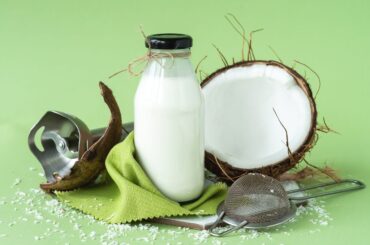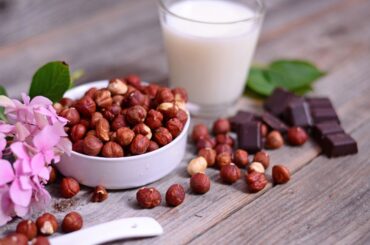Ever found yourself contemplating the fate of those leftover orange peels after a zesty citrus snack? Here’s a delightful revelation: orange peels are a treasure trove of goodness, boasting essential nutrients, like vitamin C and antioxidants.
This revelation not only elevates orange peel tea to a delectable treat but also positions it as a healthy choice for your well-being!
This article is tailored for curious individuals and budding tea lovers keen on discovering a natural and revitalizing drink. If you relish exploring novel flavors and discovering the advantages of diverse ingredients, you’ve come to the ideal destination.
Join us in exploring the realm of orange peel tea as we uncover its delightful mysteries.
What Does Orange Peel Tea Do?
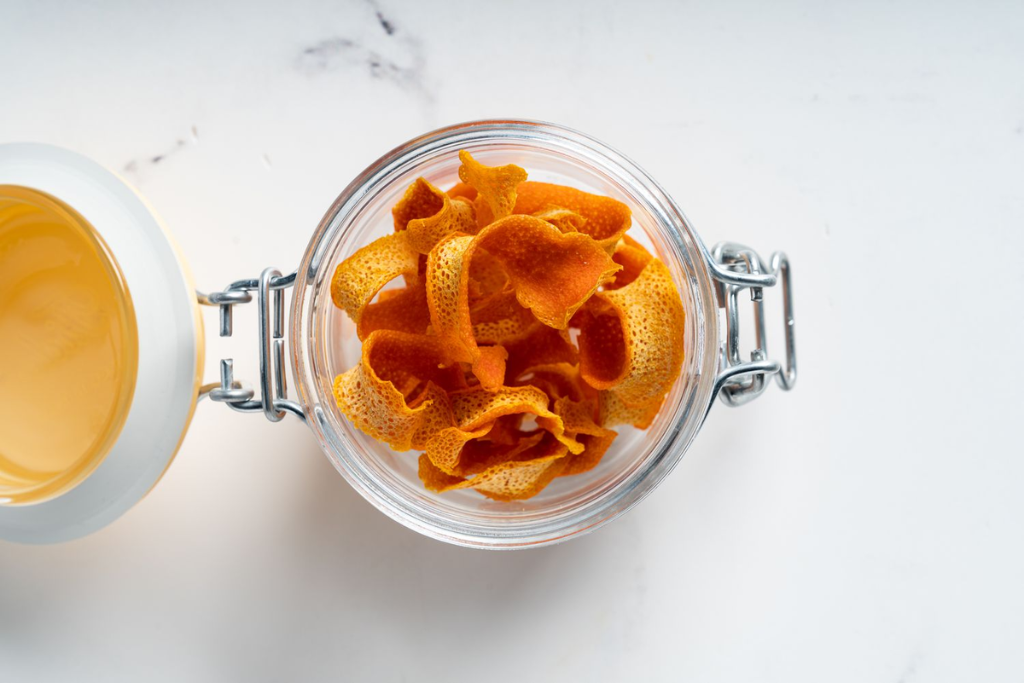
Orange peel tea is a delightful brew that infuses your cup with citrusy goodness. It’s crafted by steeping dried orange peels in hot water, letting their natural oils and flavors meld into the liquid.
The outcome is a fragrant, tasty drink that not only pleases the palate but also provides numerous health advantages.
One of the key benefits orange peel tea does is boost your immune system. Packed with vitamin C and other essential nutrients, it provides a natural defense against illnesses. Additionally, this tea helps with digestion.
The oils in the orange peel can stimulate your digestive system, making it a great option after a heavy meal. It’s also known to support healthy skin, thanks to its rich antioxidant content. So, not only does orange peel tea taste delightful, but it also offers a range of positive effects for your well-being.
What Does Orange Peel Tea Taste Like?
When you take a sip, you’ll experience a bright burst of citrus that’s both tangy and mildly sweet. It’s like capturing the essence of a freshly peeled orange in a warm, soothing beverage.
What are Some Creative Ways to Use Orange Peels Besides Making Tea?
One inventive use is to create a zesty citrus-infused vinegar cleaner. Add orange peels with white vinegar in a jar and let it sit for a few weeks. This concoction can be strained and used as a natural and aromatic cleaner for surfaces around your home.
Another smart way to utilize those leftover orange peels is to create your own DIY air freshener. All you need to do is gently simmer the orange peels in a pot of water on your stove, and soon, your home will be filled with a delightful citrusy aroma.
This natural air freshener serves as an excellent, chemical-free alternative to store-bought options and aligns perfectly with sustainable living by making the most of every part of the fruit.
10 Orange Peel Tea Benefits
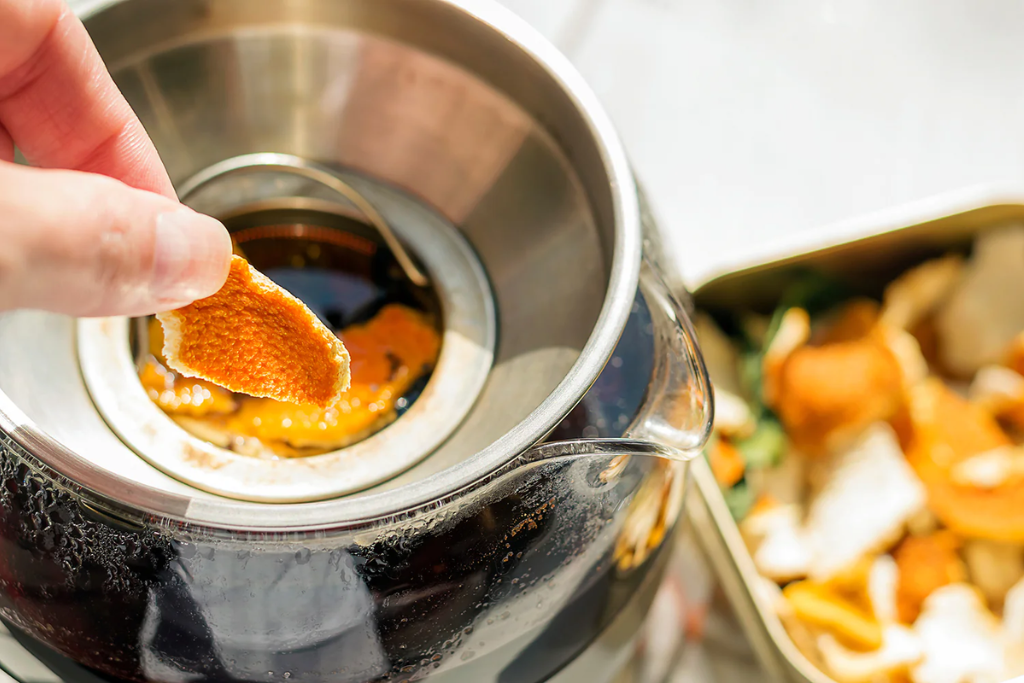
Orange peel tea offers many health benefits that can enhance your overall well-being. Let’s delve into these advantages:
Digestive Support
Orange peel tea aids digestion, reducing bloating and discomfort. Enjoy a cup after meals for optimal digestion. Simply simmer orange peels in hot water for 10 to 15 minutes.
Immune Booster
Loaded with vitamin C, this tea strengthens your immune system, helping your body fend off illnesses. Sip a cup daily, especially during flu season. Steeping dried orange peels in hot water for 5 to 7 minutes will do the trick.
Skin Radiance
The antioxidants in orange peel tea rejuvenate your skin, promoting a healthy glow. Consume a daily cup to support radiant skin. Steep dried orange peels in hot water and add honey for added benefits.
Weight Management
Orange peel tea boosts metabolism and curbs appetite, making it a valuable ally in weight management. Drink a cup before meals to control your appetite. Steeping dried orange peels in hot water for 5 to 7 minutes is all it takes.
Stress Reduction
The aroma of orange peel tea has calming properties that reduce stress and anxiety. Enjoy a calming cup in the evening by steeping dried orange peels in hot water and inhaling the soothing scent.
Blood Pressure Regulation
Regular consumption of orange peel tea may help maintain healthy blood pressure levels, promoting cardiovascular health.
Respiratory Relief
This tea can alleviate respiratory issues, like coughs and congestion, due to its natural expectorant properties. Drink it when you have respiratory discomfort, or inhale the steam after steeping dried orange peels in hot water.
Improved Sleep
Orange peel tea’s soothing properties enhance sleep quality. Enjoy a cup before bedtime for better sleep. Steep dried orange peels in hot water and sip slowly.
Oral Health
Natural compounds in orange peel tea freshen your breath and support oral health. Swish a cup briefly in your mouth for oral hygiene.
Antioxidant Protection
Rich in antioxidants, orange peel tea safeguards cells from damage, promoting overall health. Make it a daily habit to enjoy these antioxidant benefits. Steep dried orange peels in hot water and savor the delightful flavor.
5 Potential Side Effects of Orange Peel Tea
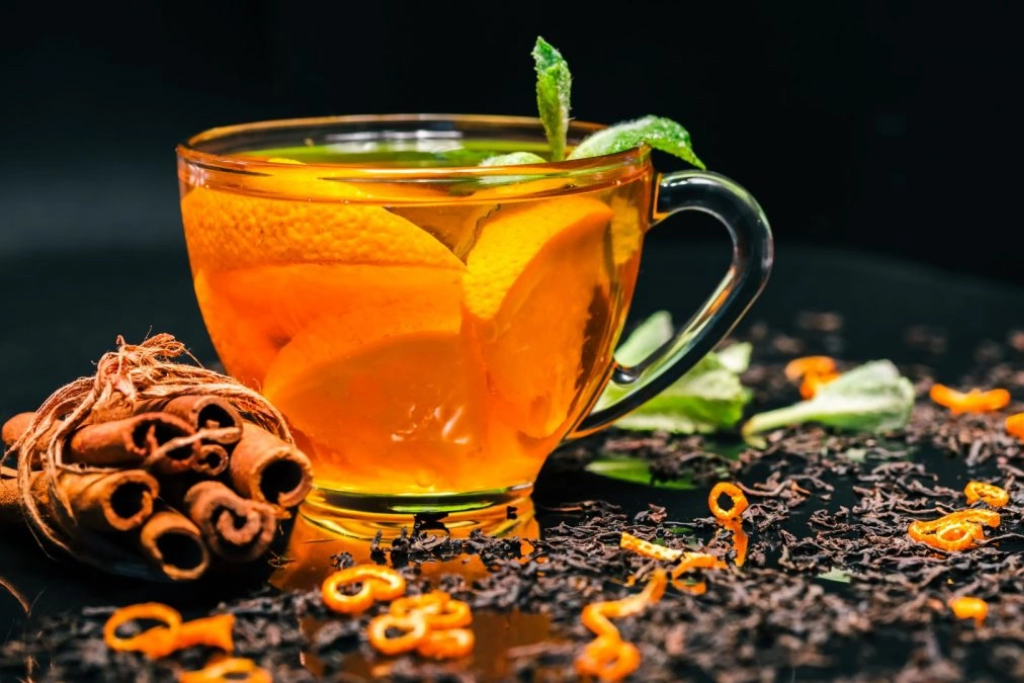
While orange peel tea offers various health benefits, it’s essential to be aware of potential side effects:
Heartburn
Drinking excessive orange peel tea may lead to heartburn or acid reflux in some individuals. This discomfort arises due to the tea’s citrusy nature, which can irritate the esophagus.
Allergic Reactions
In rare instances, individuals may exhibit allergic reactions to certain compounds present in orange peels. These reactions can manifest as skin rashes, itching, or even respiratory difficulties. Should you suspect an allergy, it is imperative to cease usage immediately and promptly seek professional medical assistance.
Tooth Sensitivity
The acidity in orange peel tea can erode tooth enamel over time, potentially leading to tooth sensitivity. It’s advisable to rinse your mouth with water after drinking the tea to minimize this effect.
Stomach Discomfort
In some instances, drinking large quantities of orange peel tea may cause stomach discomfort, including cramps and diarrhea. To avoid this, consume the tea in moderation.
Interactions with Medications
Prior to including orange peel tea in your daily regimen, particularly if you are using medication, it is imperative to understand that there is a potential for interaction with certain drugs. This interaction could potentially influence the absorption or effectiveness of your medication.
How to Dry Orange Peels for Tea
Drying orange peels at home is an excellent way to make your orange peel tea with fresh and natural ingredients. It adds a refreshing flavor to your tea while also reducing waste. Enjoy your homemade orange peel tea! Here’s how you can do it:
Gather Fresh Orange Peels
Start by collecting fresh orange peels from organic oranges. Wash them thoroughly to remove any dirt or residue.
Peel Carefully
Use a vegetable peeler or a knife to carefully remove the orange peel from the fruit. Try to get large, uniform pieces.
Preheat Your Oven
Preheat your oven to a low temperature, around 200°F (93°C).
Place the Peels on a Baking Sheet
Lay the orange peels flat on a baking sheet in a single layer. Make sure they don’t overlap to ensure even drying.
Bake Until Dry
Put the baking sheet with the orange peels into the preheated oven. Allow them to bake for about 1 to 2 hours or until they become dry and crispy. Check on them occasionally.
Cool and Store
Once dried, remove the orange peels from the oven and let them cool completely. Store them in an airtight container in a cool, dry place.
Use for Tea
When you’re ready to make orange peel tea, take a few dried peels, chop or crush them, and steep them in hot water for a delightful citrusy tea.
Orange Peel Tea Nutritional Facts
Orange peel tea has many nutrients and few calories. A typical portion has few calories, carbs, and no fat. The vitamin C, potassium, and antioxidants strengthen your immune system and overall health.
Estimated Nutritional Values Per Serving:
- Calories: 5-10 kcal
- Carbohydrates: 1-2 grams
- Protein: 0 grams
- Fat: 0 grams
- Saturated Fat: 0 grams
- Cholesterol: 0 milligrams
- Sodium: 0 milligrams
- Potassium: 15-20 milligrams
- Sugar: 0 grams
- Vitamin C: 3-5 milligrams
- Calcium: 2-3 milligrams
Disclaimer: Nutritional values for orange peel tea can vary based on factors like peel quantity, steeping time, and added ingredients. Antioxidant content remains consistent, but other nutrients may change with additives.
FAQs
What Happens When You Boil an Orange?
When you boil an orange, its peel releases essential oils and aromatic compounds into the water. This creates a fragrant infusion that can be used to make beverages, like orange peel tea. The boiling process softens the peel, making it easier to extract these flavorful elements.
What is Orange Peel Tea Good for?
Orange peel tea is good for a variety of health benefits. It’s rich in antioxidants and vitamin C, which can boost the immune system and help fight off illnesses.
Can You Boil Orange Peels and Drink It?
Yes, you can boil orange peels to make a flavorful and aromatic tea. Boiling releases the natural oils and flavors from the peel, creating a delightful infusion. This tea is tasty and offers various health benefits due to the nutrients in the orange peel.
Can I Drink Orange Peel Tea at Night?
Yes, you can drink orange peel tea at night. It’s caffeine-free and can be a soothing and relaxing beverage choice before bedtime. However, be mindful of any potential allergies or sensitivities you may have to citrus fruits.
Does Boiling Oranges Destroy Vitamin C?
Boiling oranges can lead to some loss of vitamin C, as this vitamin is sensitive to heat. However, much of the vitamin C is retained in the water, especially if you consume the liquid after boiling. To preserve the maximum vitamin C content, minimizing boiling time and considering using lower temperatures for preparation is recommended.



